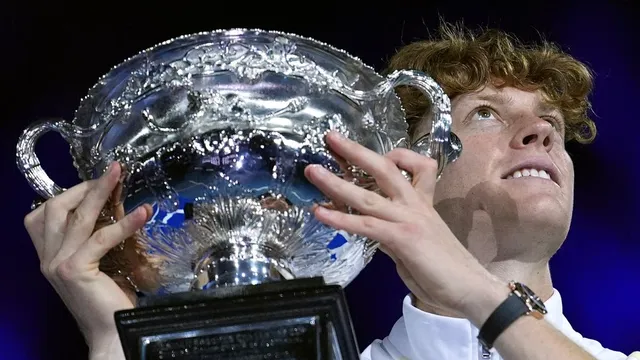
Heckler targets Alexander Zverev's past during Australian Open defeat
2025-01-27 05:01- A heckler interrupted Alexander Zverev's post-match speech at the Australian Open final on January 25, 2025.
- The heckler referenced past domestic abuse allegations made against Zverev by former partners Olya Sharapova and Brenda Patea.
- Zverev responded by stating that there have been no new accusations in nine months, emphasizing the lack of evidence against him.
Express your sentiment!
Insights
In Australia, tennis player Alexander Zverev faced criticism during his post-match speech at the Australian Open final on January 25, 2025. After losing to Jannik Sinner, Zverev was interrupted by a woman in the crowd who made references to domestic abuse allegations made against him by former partners Olya Sharapova and Brenda Patea. This disruption occurred as Zverev attempted to deliver his runner-up speech, highlighting the ongoing controversy surrounding his personal life. Zverev, who had repeatedly denied the allegations, remarked that the heckler was seemingly the only one in the stadium who believed the claims after a lengthy investigation found no new accusations against him for nine months. The remarks by the heckler tapped into a sensitive topic for Zverev, who has faced scrutiny over accusations of repeat domestic abuse from past relationships. Sharypova had claimed abuse from Zverev in various locations in 2019 but chose not to take her allegations to the criminal justice system. Similarly, Patea had alleged that Zverev physically harmed her during their relationship, which led to court cases in Berlin, resulting in a hefty penalty order against Zverev. The ATP took no action following a comprehensive investigation that did not yield further evidence of wrongdoing. Zverev's latest loss at the Australian Open marks a notable event in a career shadowed by legal inquiries and public sentiment surrounding his alleged conduct off the court. After stepping up to the microphone to present his speech, Zverev was quickly rebuffed by the heckler, which appeared to impact his response during a tense atmosphere post-defeat. He addressed the crowd saying that the allegations had not been validated for months and suggested that the heckler's outburst did not reflect the views of most present. This incident represents a convergence of sports and societal accountability, as public figures like Zverev navigate serious accusations that permeate the narratives surrounding their sporting achievements. The Australian Open served as a backdrop for both Zverev's professional struggles and the societal critique concerning domestic violence and its visibility in the sports world. As Zverev deals with these external pressures, his future both on and off the court will likely remain intertwined with these pressing issues.
Contexts
The impact of domestic violence allegations on athletes is a multifaceted issue that has garnered significant attention in recent years. Allegations of domestic violence not only affect the personal lives and relationships of the athletes involved but can also have profound implications for their professional careers and the sports organizations they represent. When an athlete is accused of domestic violence, it often leads to immediate public scrutiny, media backlash, and a swift response from teams and leagues. Many organizations have enacted policies that require athletes to be suspended or face internal investigations, reflecting a zero-tolerance stance on domestic violence. This can lead to a loss of income, sponsorships, and, in some cases, the end of their sporting career. The reputational damage to the athlete can be severe, affecting their mental health and overall well-being as they navigate the fallout from the allegations. Moreover, the societal response to these allegations tends to be polarized. Some fans may choose to continue supporting an athlete despite allegations, based on personal biases and love for the sport, while others may advocate for greater accountability and consequences for such behavior. This division can lead to protests and movements within fan communities, as seen in various instances where athletes have faced allegations. The reaction from the public illustrates the broader conversation about domestic violence and gender roles within sports. Athletes are often seen as role models, and their actions can significantly influence public perceptions of domestic violence, either perpetuating a culture of silence or spearheading necessary conversations about accountability and change. In recent years, numerous high-profile cases have brought the issue of domestic violence allegations into the spotlight, showcasing the need for comprehensive strategies to address these incidents. Many sports organizations are working to implement programs that focus on prevention, education, and support for victims. These initiatives intend to create a culture of respect within sports, recognizing that athletes can play a critical role in cultural shifts. Additionally, some teams are collaborating with advocacy groups to better understand the complexities surrounding domestic violence and ensure that appropriate measures are taken to support victims while holding alleged perpetrators accountable. As the public becomes more aware of these issues, the demand for transparency and responsibility in handling such cases has only intensified. Ultimately, the impact of domestic violence allegations on athletes extends beyond the immediate consequences of suspensions or legal ramifications. It includes long-lasting effects on the athlete's legacy, relationship with fans, and the broader implications for the sport itself. As the conversation around domestic violence continues to evolve, it is paramount for sports organizations, athletes, and fans to engage in discussions that promote accountability, encourage positive behavioral changes, and support victims. Moving forward, the goal should be to foster an inclusive environment where respect and responsibility are prioritized, ensuring that athletes recognize the power of their platform and actions in contributing to systemic change.